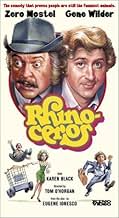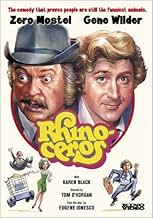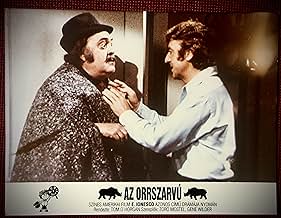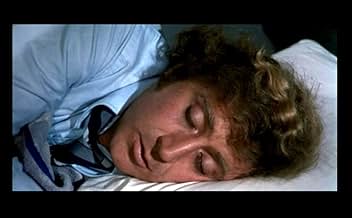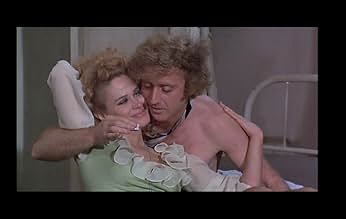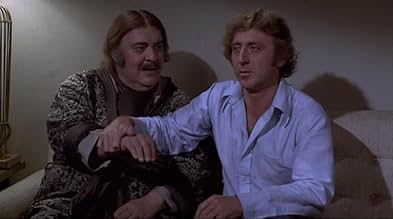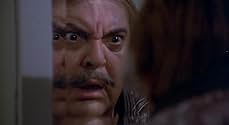Adicionar um enredo no seu idiomaA boozing young man in love with his co-worker finds that everyone around him, even his pompous and condescending best friend, is changing into a rhinoceros.A boozing young man in love with his co-worker finds that everyone around him, even his pompous and condescending best friend, is changing into a rhinoceros.A boozing young man in love with his co-worker finds that everyone around him, even his pompous and condescending best friend, is changing into a rhinoceros.
- Prêmios
- 1 indicação no total
- Young Woman
- (as Melody Santangelo)
- Woman in Black with Baby Carriage
- (não creditado)
- Direção
- Roteiristas
- Elenco e equipe completos
- Produção, bilheteria e muito mais no IMDbPro
Avaliações em destaque
Depressed, bored accountant Stanley (Gene Wilder) spends his week-days crunching numbers and his weekends drinking himself into a haze. His friend John (Zero Mostel) disapproves, but still meets Stanley every Sunday lunchtime to talk to him about the error of his ways. One particular Sunday, their lunch is interrupted when a stampeding rhinoceros charges down the street outside the restaurant. Soon, more and more rhinoceroses are sighted in town and Stanley gradually begins to realise that the entire population is turning into these huge pachyderms. More alarming still is that everyone that Stanley counts on to "remain" human seems to be switching to rhinoceros form too - his work colleagues (Joe Silver, Robert Weil, Percy Rodriguez), his dream girl Daisy (Karen Black), and even his best friend John. Stanley is determined not to conform, but as the human numbers dwindle and the rhinoceros population soars, will he be able to resist?
One of the main problems with this film version of Rhinoceros is that it doesn't use the possibilities of film to "open-up" the constraints of its stage-bound play origins. For instance, during the scene where Mostel's character transforms into a rhinoceros, Wilder keeps commenting on the bump appearing on his forehead and the greyness of his skin, but there's no bump or greyness visible. Here was an opportunity to use the visual advantages that film has over the theatre stage, but it remains an unused opportunity. In fact, at all points the film refuses to become cinematic and constantly has a feel of "filmed theatre" about it. However, in other ways Rhinoceros is quite well done and credit needs to be given where it is due (Maltin rated this film BOMB, which shows how wide of the mark Maltin is prone to be). Wilder and Mostel interact brilliantly, relishing the play's enigmatic and often self-contradictory dialogue. Mostel's transformation sequence - done without make-up or visual effects, as noted earlier - is almost compensated by the sheer outrageous energy that Mostel invests in it. And, by removing the historical and political subtext of the original play, I think they've actually made it more timeless by focusing more on the themes of conformity (after all, don't we all relate to how it feels to spend our lives conforming, losing more and more of the animal-like freedom that was a characteristic of primitive man?) Transforming into a rhinoceros could be viewed as a metaphor for any type of conformity - doing drugs because all your peers do them; being promiscuous because it's the norm; voting for a particular political party because everyone else on your street is in favour of that party; etc.
Not a complete success, then, but definitely a worthwhile and thought-provoking piece of cinema.
"What you are about to see," reads the introductory title card, "could never take place. Several eminent scientists have assured us of this fact, for, as they are quick to point out... the world is flat."
Are they? That dismal attempt at irony is an omen for the rest of the movie. Whatever value Eugène Ionesco's absurdist play may have had on stage, this film adaptation is a leaden allegory, filled with room-wrecking slapstick, that is exhausting, exasperating and tedious. Zero Mostel, who won a Tony for playing the same role on Broadway in 1961, has a transformation scene that is fascinating for its sweaty excess, but his antics can be better appreciated in "The Producers" (1968) in which he and Gene Wilder are actually funny. In this film, the two play off each other just as well, but it doesn't come to much.
No rhinoceroses appear, which might sound like admirable restraint (if not an impoverished budget), but the movie already opened up the play considerably and added a dream sequence and a lot of Keystone Comedy antics. Not showing us rhinoceroses just seems irritatingly coy.
Você sabia?
- CuriosidadesDuring the rehearsals of his transformation scene, Zero Mostel refused to break any of the props, wanting to leave the destruction until he was actually shooting the scene.
- Citações
John: So, you finally managed to get here. You're late as usual, of course.
Stanley: No, I...
John: Our appointment was for eleven thirty. It's practically noon now.
Stanley: I'm sorry John. Have I kept you waiting long?
John: No. I just got here myself.
Stanley: Oh, well, then I don't feel so bad.
John: That's beside the point. I don't like to be kept waiting and since you're never on time, I always come late on purpose.
- ConexõesFeatured in No Small Parts: Anne Ramsey (2014)
Principais escolhas
- How long is Rhinoceros?Fornecido pela Alexa
Detalhes
- Data de lançamento
- País de origem
- Idioma
- Também conhecido como
- Eugene Ionesco's Rhinoceros
- Locações de filme
- Empresas de produção
- Consulte mais créditos da empresa na IMDbPro
- Tempo de duração
- 1 h 44 min(104 min)
- Proporção
- 1.85 : 1


